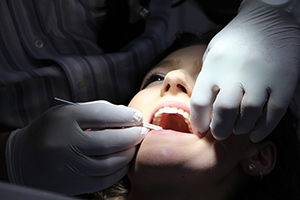
Accidents happen to everyone, but some types can have longer lasting effects than others. Dental trauma is damage caused by an injury to your teeth, gums, alveolar bone, and the surrounding soft tissues including the lips, tongue and inner cheeks. When you’re involved in a motor vehicle collision, a sporting accident, or something as mundane as falling down the stairs, if your facial area is injured it’s worth paying a visit to your dentist to determine whether you’ve experienced any trauma. The damage might not be obvious at first, but waiting could result in unexpected problems such as tooth death, crown fractures, luxation, and nerve damage.
Dr. Michael Handler can help with all types of oral injuries
Dental Emergency ServicesA dead tooth can occur as a result of being hit in the mouth with an object or during a fall. Teeth consist of a combination of hard and soft tissue, and when the nerves in the inner layer of pulp become damaged, either by injury or decay, they stop delivering blood to the tooth. This can cause an infection that results in the death of the nerve.
How to treat this:
It’s important to get medical attention for a dead tooth early. If the tooth is untreated, the bacteria can cause an infection that spreads through your other teeth, jawbone and gums. Root canal therapy is the most common method of treatment, which cleans out the tooth, fills it with composite resin and covers it with a crown. If the tooth is too far gone for treatment, your dentist will usually extract it and advise replacing it with a bridge, partial denture or implant.
When existing crowns in your mouth become fractured during a dental trauma, the result will be either a complicated fracture or an uncomplicated one. If you have the first, you probably have exposed the pulp and nerve of the tooth. An uncomplicated one includes damage to the tooth enamel, but the pulp and nerve aren’t affected.
How to treat this:
A complicated crown fracture requires the dentist to remove the remains of the crown and evaluate the condition of the tooth. If it can be saved, he may have to perform root canal therapy either for the first time or to repeat the process if the original filling has become damaged or dislodged. After restoring the body of the damaged tooth, a new crown will be fitted to cover and protect it. An uncomplicated fracture usually only requires minimal smoothing of the damaged tooth, following by mounting porcelain veneer to protect it.
A tooth luxation is when a tooth is dislodged from its position in your mouth. This is a common problem arising from dental trauma, and it’s usually accompanied by bruising and inflammation, or even possibly damage to the gum and jawbone where it was located.
How to treat this:
Your dentist will typically reposition a loose tooth and stabilize it using a flexible dental splint. He'll check the condition of the pulp and may prescribe antibiotics and special mouth rinse to reduce the risk of infection. After a few weeks, a dental examination will determine whether the tooth is resuming its normal position and the pulp is healthy. If not, you may need either root canal therapy followed by a crown, or removal of the tooth and replacement with an implant.
If you’ve been a victim of dental trauma, don’t wait until problems develop to schedule an appointment. Contact the best dentist in Scarborough at 416-267-4661 or click here to book online.
Do you ever feel nervous about dentist appointments? Rest assured: we cater to nervous and anxious patients in a gentle and considerate manner. Call us now to schedule a free consultation!